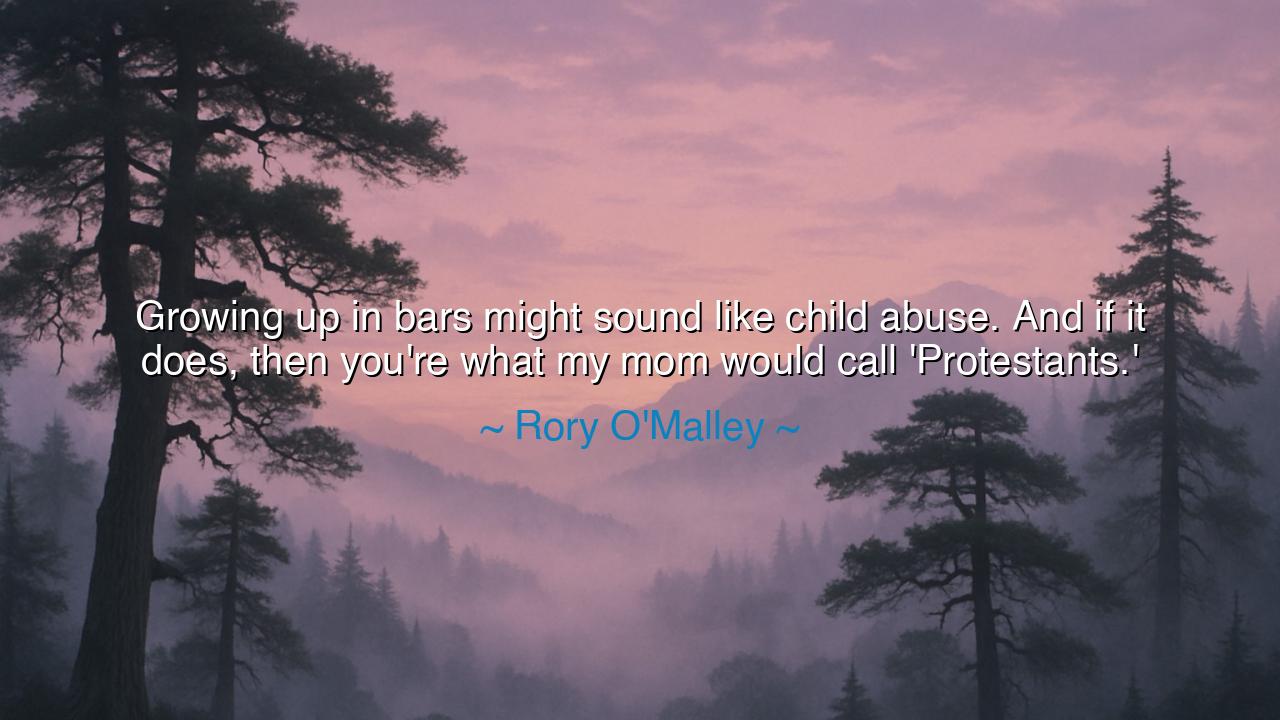
Growing up in bars might sound like child abuse. And if it does
Growing up in bars might sound like child abuse. And if it does, then you're what my mom would call 'Protestants.'






“Growing up in bars might sound like child abuse. And if it does, then you're what my mom would call 'Protestants.'” — in this jesting confession, Rory O’Malley, actor and son of Irish heritage, speaks with the humor of his people and the quiet wisdom of one who knows that love, laughter, and culture are often misunderstood by those outside their walls. His words may sound light, but within them lie themes of family, identity, and the strength of heritage — the power of growing up among the songs, stories, and imperfections that make life human.
For to “grow up in bars” is not, in his meaning, a tale of neglect or decay, but of community. In many Celtic and working-class traditions, the pub is no den of vice but a place of belonging — where men and women gather to speak, sing, grieve, and celebrate. It is a temple of warmth against the cold world outside. The child who grows up there learns not of corruption, but of connection; learns to see life in all its shades, to witness both sorrow and joy. To the uninitiated, this may seem scandalous — but to those who know, it is simply living close to the heart of humanity.
The ancients, too, knew this kind of fellowship. In the old taverns of Athens, philosophers and poets alike gathered to drink and debate beneath the olive lamps. Socrates himself often taught among cups of wine, for he knew that wisdom is not born in silence alone, but in the meeting of souls unguarded. So when Rory’s mother teases that those who disapprove must be “Protestants,” she speaks, with humor, to an ancient truth: that joy and faith, laughter and reverence, need not be enemies. Her jest is not about creed, but about spirit — the spirit that embraces imperfection and still finds holiness in laughter.
There is also, in this quote, the subtle celebration of the Irish matriarch — the mother who guides her child not through polished sermons, but through wit, music, and resilience. Her wisdom is wrapped in humor, her faith hidden in laughter. She teaches her child to see life not as a thing to be purified, but as something to be embraced — rough, loud, and real. For in the Irish soul, sorrow and joy are twins, and both are welcome at the table. The bar, the song, the laughter — these are not escapes from life’s hardship, but ways of surviving it.
The story reminds us, too, of the power of cultural inheritance — that the customs of our ancestors may be misunderstood by others, yet they hold truths of endurance and identity. To be judged for one’s way of life is the fate of every people who live close to the heart. The Greeks were mocked for their feasts; the Celts for their songs; the Jews for their mourning; and yet from these traditions came the deepest art and the most enduring faith. Joy and reverence are not opposites, but two hands of the same body — each incomplete without the other.
In Rory’s humor lies a deeper courage: the courage to own one’s origins, to speak proudly of the places that shaped him, even if they seem strange to outsiders. He knows that love is not measured by appearances, but by presence — by the mother who brought him into that loud, living world, and taught him to laugh at judgment rather than fear it. His story is not about rebellion, but about acceptance — the freedom to cherish where one comes from, without apology.
So, my child, learn from this: never be ashamed of your roots, nor of the ways your people celebrate life. What others call folly may be your wisdom; what they scorn as rough may be your beauty. Hold your traditions like torches — not to blind others, but to light the path of your own belonging. Remember that laughter, too, is sacred. And when the world judges you for your way of living, smile — as Rory O’Malley’s mother did — and say, “Ah, then perhaps you just don’t understand.” For in that smile lies the strength of those who know joy not as luxury, but as survival — the ancient and holy laughter of the human soul.






AAdministratorAdministrator
Welcome, honored guests. Please leave a comment, we will respond soon